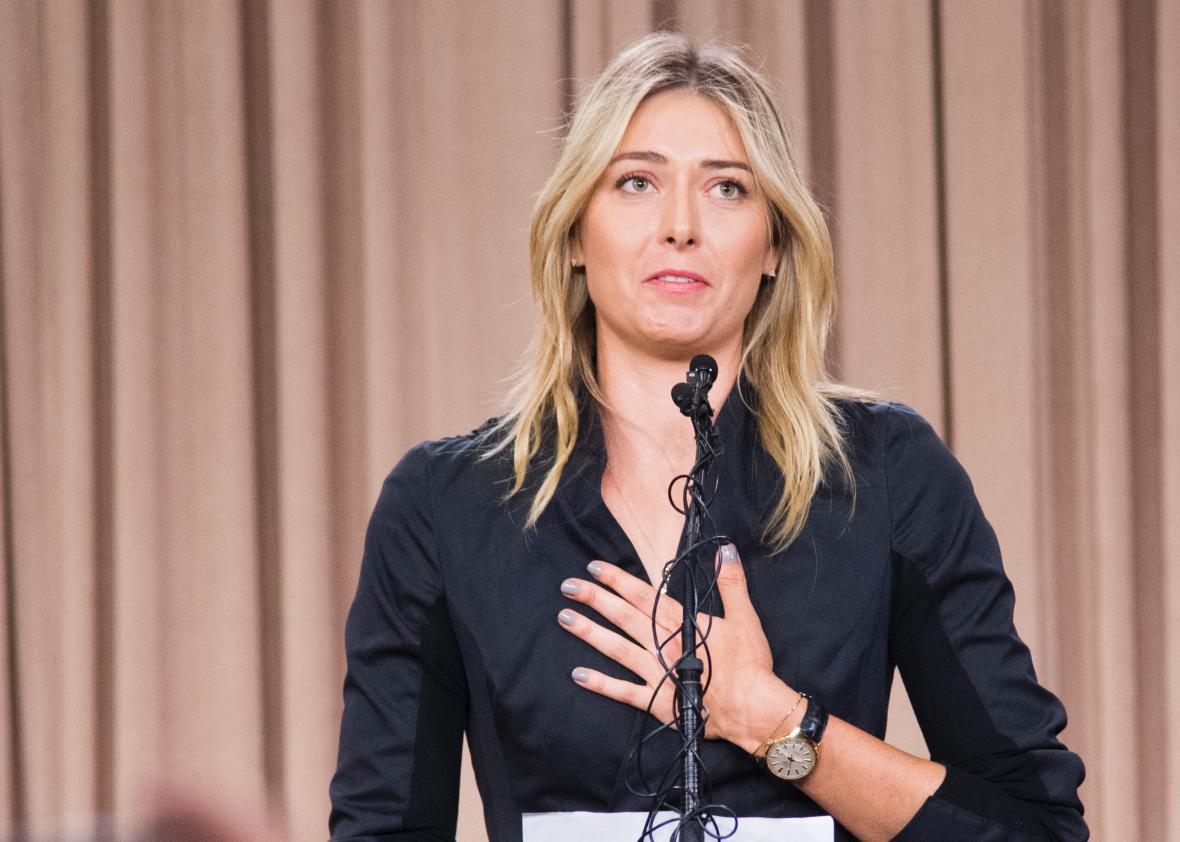Five-time Grand Slam champion Maria Sharapova has been suspended from competition for two years for failing a drug test at this year’s Australian Open. Sharapova tested positive for meldonium, a drug used to increase blood flow.
The World Anti-Doping Agency banned meldonium on Jan. 1, 2016. Sharapova claims she had been taking it since 2006 and has maintained that she did not know the status of the drug had been changed. In a report issued Wednesday, the International Tennis Federation said that while Sharapova’s violation of the rules was “not intentional” she is the “sole author of her misfortune” and bears “sole responsibility for the contravention, and very significant fault, in failing to take any steps to check whether the continued use of this medicine was permissible.”
In a Facebook post, Sharapova said she will “immediately appeal.”
“I cannot accept an unfairly harsh two-year suspension,” she wrote. “The tribunal, whose members were selected by the ITF, agreed that I did not do anything intentionally wrong, yet they seek to keep me from playing tennis for two years. I will immediately appeal the suspension portion of this ruling to CAS, the Court of Arbitration for Sport.”
She noted that the ITF asked that she be suspended for four years.
In March, Sharapova admitted to taking the substance, saying at a press conference, “I failed the test and take full responsibility for that. … I had been taking this medicine for the past 10 years, but on Jan. 1 this became a prohibited substance which I did not know.”
Sharapova was provisionally suspended on March 12, pending a two-day hearing in May in front of an independent tribunal. (As Sharapova noted in her Facebook post, the claim that the tribunal is independent is a bit overblown, given that the ITF appoints its members.) The report that came out of that two-day hearing casts doubt on Sharapova’s claims about why she used the drug. “The manner of its use, on match days and when undertaking intensive training, is only consistent with an intention to boost her energy levels,” the report reads. Sharapova also failed to include Mildronate—the drug she was taking in which meldonium is the active ingredient—on doping control forms that require players to list “any prescription/non-prescription medications or supplements, including vitamins and minerals, taken over the past 7 days.” The report claims that “at Wimbledon 2015 [Sharapova] had used Mildronate 6 times in the past 7 days, and, at the Australian Open 2016, 5 times in the past 7 days.” The tribunal concludes it “was a deliberate decision, not a mistake,” to leave the substance off the doping control forms.
The report also addresses what is expected to be at the heart of Sharapova’s appeal—that the ITF did not do enough to warn her that meldonium had been newly banned. Based on Sharapova’s previous disclosures of meldonium use, “the ITF knew or ought to have known that the player was using Meldonium,” the report says. “There remains the argument that the ITF was in breach of its duty under article 3.1.3 to take reasonable steps to publicize any amendments made by WADA to the Prohibited List.”
According to the report, the Women’s Tennis Association and the ITF each sent emails to players in December 2015 that referenced changes to the ITF’s Tennis Anti-Doping Programme. Neither email explicitly said that the prohibited list had been changed, though, or that meldonium had been added to the list. The tribunal’s report ultimately concludes that the ITF fulfilled its duty to notify players about changes to the anti-doping program when it published the WADA changes on its website.
The 29-year-old star’s last major win came in 2014 at the French Open. She reached the final at the 2015 Australian Open, losing to Serena Williams. Sharapova’s two-year suspension is back-dated to begin Jan. 26, the day of the failed drug test, which means the earliest she could be eligible to compete, if her appeal is unsuccessful, is January 2018. At that point, she will be 30 years old, and could still have plenty of good years ahead of her if she chooses to continue to playing. Four of the top 14 active female players—Serena and Venus Williams, Roberta Vinci, and Samantha Stosur—are older than 32.
